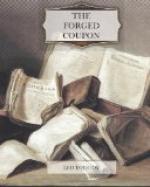The roots of maternal love are sunk deep in conservatism. The child’s physical well-being is the first essential in the mother’s eyes—the growth of a vigorous body by which a vigorous mind may be fitly tenanted—and this form of materialism which Tolstoy as a father accepted, Tolstoy as idealist condemned; while the penury he courted as a lightening of his soul’s burden was averted by the strenuous exertions of his wife. So a rift grew without blame attaching to either, and Tolstoy henceforward wandered solitary in spirit through a wilderness of thought, seeking rest and finding none, coming perilously near to suicide before he reached haven.
To many it will seem that the finest outcome of that period of mental groping, internal struggle, and contending with current ideas, lies in the above-mentioned “What then must we do?” Certain it is that no human document ever revealed the soul of its author with greater sincerity. Not for its practical suggestions, but for its impassioned humanity, its infectious altruism, “What then must we do?” takes its rank among the world’s few living books. It marks that stage of Tolstoy’s evolution when he made successive essays in practical philanthropy which filled him with discouragement, yet were “of use to his soul” in teaching him how far below the surface lie the seeds of human misery. The slums of Moscow, crowded with beings sunk beyond redemption; the famine-stricken plains of Samara where disease and starvation reigned, notwithstanding the stream of charity set flowing by Tolstoy’s appeals and notwithstanding his untiring personal devotion, strengthened further the conviction, so constantly affirmed in his writings, of the impotence of money to alleviate distress. Whatever negations of this dictum our own systems of charitable organizations may appear to offer, there can be no question but that in Russia it held and holds true.
The social condition of Russia is like a tideless sea, whose sullen quiescence is broken from time to time by terrific storms which spend themselves in unavailing fury. Reaction follows upon every forward motion, and the advance made by each succeeding generation is barely perceptible.
But in the period of peace following upon the close of the Crimean War the soul of the Russian people was deeply stirred by the spirit of Progress, and hope rose high on the accession of Alexander II.
The emancipation of the serfs was only one among a number of projected reforms which engaged men’s minds. The national conscience awoke and echoed the cry of the exiled patriot Herzen, “Now or never!” Educational enterprise was aroused, and some forty schools for peasant children were started on the model of that opened by Tolstoy at Yasnaya Polyana (1861). The literary world throbbed with new life, and a brilliant company of young writers came to the surface, counting among them names of European celebrity, such as Dostoevsky, Nekrassov, and Saltykov. Unhappily the reign of Progress was short. The bureaucratic circle hemming in the Czar took alarm, and made haste to secure their ascendancy by fresh measures of oppression. Many schools were closed, including that of Tolstoy, and the nascent liberty of the Press was stifled by the most rigid censorship.




